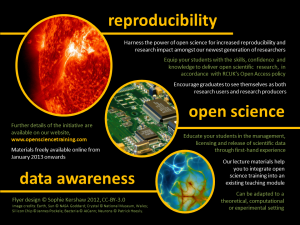You could be forgiven for thinking I’d gone very quiet this week. As many of you may remember, the pilot scheme for my Open Science Training Initiative kicked off on January 10th. It’s been a pretty hectic time since then, but we’ve finally reached the closing day – the students are pushing final versions of all their work onto GitHub in the next hour, before presenting their findings from 10:30am onwards.
I’d had this insanely optimistic idea at the outset of blogging progress with the course every other day, or at least at the end of each of the rotation phases. Yep, that turned out to be WAY too optimistic. Once all the lecturing and project supervision meetings were factored in, I barely made it anywhere near my computer each day. Those of you who emailed me may have noticed the, ahem, somewhat tardy replies. All for good reason though – the students have done a fantastic job, produced some really creative work, and I’m looking forward to seeing all the results today – even if it’ll leave me stuck under a stack of marking for a fortnight!
I released a short feedback questionnaire to the students just now, so by the end of today we should have some idea of what they’ve enjoyed in the course, and importantly, how they think we could improve it in the future. I don’t think I’ve ever been subjected to this much judgment in one go before, so let’s hope it all goes ok… Ultimately I’ll be releasing all the findings and analysis in an evaluation report (most probably sometime in February), which will also take account of comments from the course demonstrators, some of whom were with the projects right from the beginning of the course. So keep an eye out for that.
I have to say I was seriously impressed by how they’ve taken to licensing as well. From the general show of hands I asked for in lectures, this area was completely new to all of them. This really shows how much work we need to do in educating our academics in Open practice if we’re going to aid the uptake of these approaches – at the moment, the awareness isn’t there in vast sections of the community. By the end of Phase 1 on the Monday, they’d got the hang of data, code and content licensing to the point where I was fielding some fairly subtle questions in specific cases. Some of you may have noticed me tendering one of these out to the OKFN discussion lists… GitHub for Windows proved really problematic though – more on that in the report and any other blog posts I get around to writing. We’d definitely need to do things differently in that department next time.
Anyway, proper update on the details of both rotation phases will follow, once I get through today and actually get some sleep. For now though, it’s probably time to get ready for the onslaught of the talks. It’s already snowing pretty heavily outside – something tells me I may end up walking home tonight, once the day is done! :S


 So, what of that website? I should warn you now that the site is live in its basic form, but hasn’t had its official public launch yet (announcement on that will follow when the time comes). You can find it at
So, what of that website? I should warn you now that the site is live in its basic form, but hasn’t had its official public launch yet (announcement on that will follow when the time comes). You can find it at